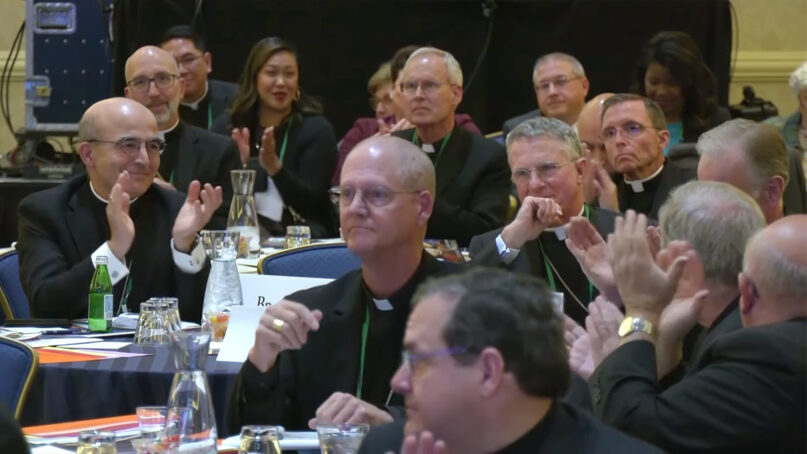(RNS) — The U.S. Catholic bishops are meeting in Orlando, Florida, next week for three days of prayer and business. If you were asked by your local bishop what topics they should discuss, what would you suggest? Feel free to make suggestions in the comment section below.
It’s likely that nothing you’d suggest is on the official agenda: The war in Ukraine, the treatment of transgender people, global warming, the culture wars over public education, economic inequality, political divisions and the rise of hate groups — the bishops have no plans to address the things foremost on the minds of Americans.
Admittedly, of the U.S. Conference of Catholic Bishops twice-yearly meetings, the agenda of the fall meeting is usually heavier. The spring meeting generally leaves more time for prayer and private discussions.
On the tentative agenda in Orlando are some complex and important topics: the USCCB Strategic Plan for 2025-2028, the National Pastoral Plan for Hispanic/Latino Ministry and a revision of Part Three of the Ethical and Religious Directives for Catholic Health Care Services.
This last item, which deals with the relationship between doctor and patient, will affect the most people. (The bishops should consult with leaders of the Catholic Health Association, which represents more than 600 Catholic hospitals and other health facilities.)
But the bishops tend to be both bureaucratic and boring, even on important topics.
During the open sessions on June 15 and 16, which will be streamed live on the USCCB website, the bishops will hear from Archbishop Christophe Pierre, the papal nuncio to the United States, and from Archbishop Timothy P. Broglio of the Archdiocese for the Military Services, USA, who was elected the bishops’ conference president last fall.
It is always interesting to hear from the nuncio to get a hint of the Vatican’s feelings about the U.S. bishops. My guess is he will speak about World Youth Day, which the pope will attend this summer in Lisbon, Portugal, and the Synod on Synodality, which will take place in Rome in October.
Some have complained that the Synod on Synodality is missing from the bishops’ agenda. I agree that the bishops should have paid more attention to the synod at past meetings, but it is too late now. Reports from dioceses and bishops’ conferences around the world were sent to Rome. The synod office is finalizing the “instrumentum laboris” or working paper for the synod, which may be released next week. Still unknown is whom the U.S. bishops have chosen to go to Rome for the synod. The Vatican intends to make these names known by the end of the month.
The most interesting discussions will take place behind closed doors in executive session, in which the bishops meet as a body or in small groups. The bishops like small group meetings because they foster informal exchange, rather than prepared speeches. They can be grouped by regions of the country or be randomly assigned.
Regional groups would lend themselves to talk about pro-life strategy to deal with the new legal and political environment after the U.S. Supreme Court’s decision to overturn Roe v. Wade in June of last year. How should they respond to divisions among Republicans, some of whom want to leave the matter to the states with no national legislation? How should they respond to Republicans who for political reasons are backing away from complete bans on abortion even at the state level?
Executive sessions would also be a good place to discuss the church’s continuing sex abuse crisis. Although relatively few new cases have occurred in this century, survivors of past abuses continue to come forward, encouraged by historic reports assembled by state attorneys general and by the extension of the time frames when survivors are allowed to sue the church.
Other controversial topics the bishops might want to discuss behind closed doors include the treatment of transgender people, the traditional Latin Mass, their relationship to the pope and the Vatican, and the growing numbers of young people who have given up on the church.
Whether they will discuss these topics or not, we won’t likely ever know. The best case would be that the bishops raise these concerns in the open, to show their people that they are taking these problems seriously. Even if they choose to talk behind closed doors, they should acknowledge that they recognize that the country and the church are in trouble and pursue an agenda that reflects their concern.






